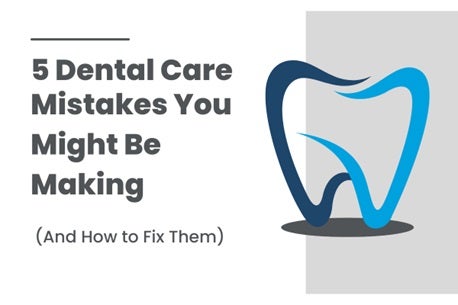Most people think brushing twice a day is all it takes for a healthy mouth. But good dental care isn’t just about how often you brush—it’s also about how you do it. Small everyday mistakes can slowly harm your teeth and gums, causing cavities, gum problems, or even tooth loss over time.
Let’s take a look at five common dental mistakes people make and how you can avoid them to keep your smile strong and healthy.

1. Skipping Brushing at Night
You might brush your teeth in the morning, but skipping brushing at night is a big mistake. All day long, food particles, bacteria, and plaque build-up in your mouth. If you don’t clean them off before bed, they sit on your teeth for hours while you sleep.
At night, your mouth produces less saliva, so it can't naturally wash away germs. This gives bacteria a better chance to cause cavities and gum issues.
How to Fix It:
Make brushing at night a non-negotiable habit. Even when you're tired, take two minutes to brush before sleeping. It’s a simple step that protects your teeth during the most vulnerable hours.
2. Brushing Too Hard or the Wrong Way
Many people think brushing harder gives better results. In reality, it damages your enamel—the protective outer layer of your teeth—and pushes gums away from the roots. Over time, this can lead to sensitivity, receding gums, and exposed roots that are more prone to decay.
How to Fix It:
Use a soft-bristled toothbrush and brush gently in small circles. Focus on being thorough, not aggressive. The right technique cleans better than pressure ever will.
3. Not Flossing Your Teeth
Brushing only cleans 60–70% of your tooth surfaces. The spaces between teeth and under the gumline can’t be cleaned with a toothbrush alone. Ignoring these areas allows plaque and food debris to build up, eventually causing cavities and gum disease.
How to Fix It:
Floss at least once a day. If you find regular floss difficult to use, try floss picks, interdental brushes, or water flosses. The key is to reach between every tooth, gently, without snapping the floss into the gums.
4. Using the Wrong Toothbrush or Not Replacing It on Time
Using the wrong toothbrush, like one that’s too big, too hard, or of low quality, can hurt your teeth instead of helping. And if you keep using the same brush for too long, the worn-out bristles don’t clean well and can even collect bacteria.
How to Fix It:
Choose a soft-bristled brush with a small head so it’s easy to reach every corner of your mouth. Change your toothbrush every 3 months, or earlier if the bristles look worn out. You can also try an electric toothbrush for a more effective and consistent clean.
5. Not Going to the Dentist Regularly
Skipping regular dental checkups is one of the biggest mistakes people make. Many wait until they feel pain to visit the dentist—but by then, the problem can already be serious. Cavities, gum disease, and infections often start without any clear signs and get worse over time.
How to Fix It:
Make it a habit to visit your dentist every six months, even if your teeth feel fine. These regular checkups help catch issues early, when they’re easier (and cheaper) to fix.
During these visits, dentists may use Dental X-ray machines to detect hidden problems inside teeth and below the gumline—issues you may not feel but could lead to long-term damage if left untreated.
Also, modern dental practices use advanced machines like apex locators, endo motors, and dental chairs that make procedures more precise, comfortable, and effective for both patients and dentists.
Conclusion
Brushing twice a day is important, but that alone isn't enough. Maintaining smart and regular habits is equally significant for good dental health. Skipping brushing at night, brushing too hard, not flossing, using an old toothbrush, or missing the dentist's appointment—these may seem like minor mistakes, but they can turn into major problems when you look ahead.
The good thing is that these mistakes are not that difficult to correct. Take a look at your daily routine once a day and make small changes where needed. Don't wait for the pain—preventing dental problems is always easier and cheaper than treating them.
A strong and beautiful smile is created not just by brushing but by good habits. Start today; your future self will thank you.